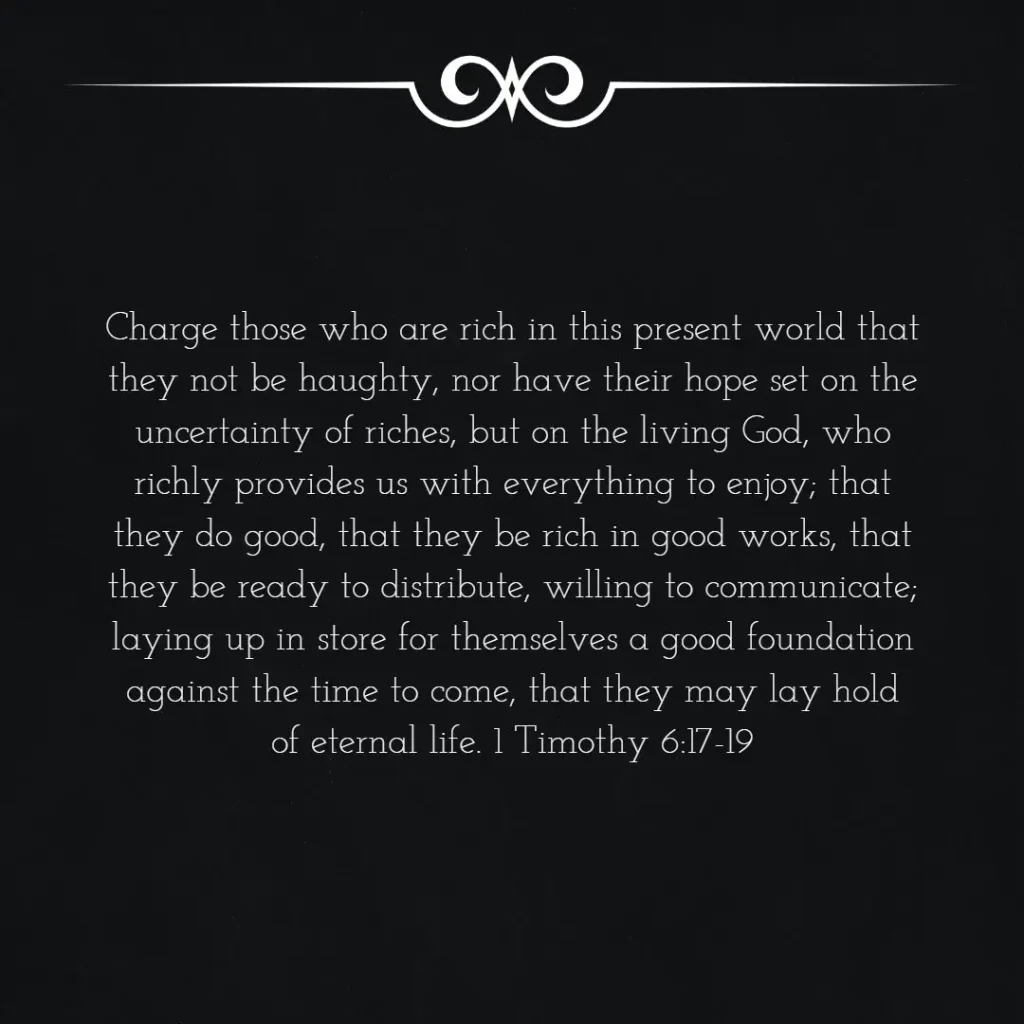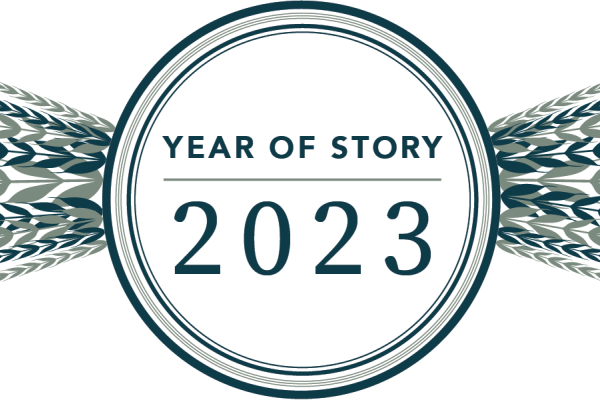Tag: impact
Bringing an “Increase” Mindset to Our Work
May 19, 2025by Ron Bare
This year, we’ve declared a theme: Year of Increase. We believe that God has entrusted each of us with resources, gifts, and talents, and it’s our responsibility to steward and increase them for His glory. Four important components of increase that we are focused on bringing an “increase mindset” to are: vision, work, wealth, and influence. We believe as our mindset in these areas grows (increases) we are fulfilling our God given purpose and capacity to serve those around us.
When we consider bringing an increase to areas of our lives, it’s only natural that work would be one of those areas. Work dominates a significant portion of our lives, and growth in this area is both normal and expected. Whether your business expands, you receive a promotion, or you acquire a new property, it is likely that you will experience growth within your work. Believe it or not, the Bible has a lot to say about work, this thing that we spend so many years of our lives doing!
Even God worked as He created the world. In Genesis, God describes His work as ‘good’ seven times. God’s greatest work was creating man and woman, in His image. When we consider that God worked, it should be no surprise that work is also a major part of our lives. In Genesis 2:15, God gives Adam and Eve this direction to work: “Then the LORD God took the man and put him into the garden of Eden to cultivate it and keep it.”
These instructions to “cultivate and keep” the garden assume that there is something to be done, or kept up with, or improved. The direction to “cultivate” insinuates development. It suggests that Adam and Eve should spend time discovering the potential of the land and the resources they were given, and bring forth abundance! This direction is not only for Adam and Eve, but for all of humanity. How do we view our own work? Do we consider the potential that our work has and what it could become? What is our vision for the work that we do? God encourages Adam and Eve not to just simply get by and live passively in the garden, but to actively invest in their resources and improve what they were given. Though this can feel like a strong, challenging command, it’s a gift that God allows us to create and improve what He has made. Creation is what God made out of nothing, but culture is what humans get to make out of God’s good creation.
Now, it’s not all so simple. The fall of man has made all of this just a little bit trickier. Because of the fall, work is hard and frustrating at times for many of us. When we dedicate years of our life to work and it becomes difficult, our goal becomes saving enough so that we will be able to stop working, or retire. Though retirement from a job or full time work may be appropriate, working for a lifetime with the sole purpose of retiring is not biblical.
Instead, work should be a blessing! Through our work, we get to join in partnership with God to create and improve the earth. We get to influence culture to see God’s good creation through the goods and services we provide. What a gift! The way that we view work should, and likely will change as we get older. However, the challenge is to never stop asking this key question: “What work does God have for me with the gifts, abilities, and experiences He has given to me?” For as long as we have breath, let that be our heart’s cry!
We believe that having an ‘increase’ mindset around work can be so impactful. It allows us to consider what things God has gifted us with and how He might have us use them. Our job is to take what He has given us, improve the earth, produce more goods and services that benefit humanity, and create a culture that brings His kingdom on earth as it is in Heaven.
If you’re interested in more resources relating to this topic, check out these books:
Every Good Endeavor by Tim Keller
Sacredness of Secular Work by Jordan Raynor
Garden City by John Mark Comer
5 Key Principles to Help Maximize Impact
December 5, 2024By Ron Bare

Many of you share our passion for maximizing our impact on this earth by using the gifts and resources that God has entrusted to us. Why do we choose to do this? For His glory, so that we can play a part in accomplishing His purpose and plans!
Whether you’re ready or not, 2025 is fast approaching, and we believe there are five key principles that can help you maximize your influence and impact in the new year!
First, remind yourself regularly that God owns all of your resources. God has been gracious to each of us by providing what we have. Just as car manufacturers define how their cars function–designing each part and assembling the car–the Creator of all things defines the purpose and use of the resources that He gives. He has entrusted resources to us, empowering us to honor Him in how we manage them. Understanding that God is the owner of our resources changes everything about how we handle our personal and business finances.
Second, learn the secret of contentment! Paul talks about learning this secret in Philippians 4. This passage reminds us that contentment doesn’t come naturally to us, because you don’t have to learn something that’s innate! We have found a few practices that have helped us learn this secret. We encourage you to take a close look at your finances and define how much is enough. How much do you need to live on annually? Don’t be afraid to throw some fun things in that budget – God does have an interest in our enjoyment, and sometimes that requires money. When you’ve defined enough, draw a finish line. Determine the amount you will accumulate, and walk in confidence, knowing that it will suffice. If you happen to accumulate more, consider giving the excess away!
Third, give extravagantly! I could talk about this principle forever. It can be a difficult one to implement but is incredibly valuable. 2 Corinthians 9 offers helpful insights on generosity and we encourage you to spend time reading through it. We truly believe our God is a God of abundance and provides us with what we need to be generous. If God is the true owner of our resources, let us show gratitude for all He has given and give back to Him! All that He asks of us is to determine how much to give, and then to give with a joyful heart.
Fourth, create a vision for how to allocate your resources. We read in Proverbs 29:18 that without vision, people perish. Take some time to look around your community, your church, your neighborhood, and your family, and ask why God may have given you the influence and wealth that He has. How does He intend for you to use your resources? What has He laid on your heart? Pay attention to those passions, and chase after them.
Finally, align your finances to this vision. Once you have an idea of how God might have you use your resources, begin to make a plan for it. Consider how you can collaborate with other organizations or families. How can you be generous with your time and money? Can your church, neighbors, or family benefit from what you have been given? Continue to pray and be open to guidance the Lord might provide for you.
What is your vision? Why has the Lord blessed you with the resources you have, whether it is an abundance of wealth or your time, talents or influence? Who in your community needs care? If you’re not sure, take some time to pray. The Lord hears our prayers; rest assured in that. We look forward to walking alongside you as you seek to serve those around you and impact the world for good in 2025!
How Investing Can Help Change the World
July 22, 2024by Ron Bare
When did you decide you wanted to change the world? In 2009, at my first Kingdom Advisors conference, I realized for the first time that I was being called to be a “pastor of finance.” The Bible is full of so much truth about money – over 2,300 verses in fact! As I watched various people in my life apply these verses, I saw that each of these people had produced contentment, generosity, freedom, clarity, purpose, and ultimately faithfulness as a result of some of these practices. I knew that if I could use my passion to help others grasp a deeper understanding in this area, we could change the world together.
This was my story but ask others how to change the world and you’ll get answers all over the board. End world hunger, commit your life to cancer research, or live overseas as a missionary? These are all admirable. Yet, as I’ve grown and learned more about the financial world, I’ve learned that investing can have a huge impact on the world. So, why should we invest? What is this impact I’m talking about? I’m glad you asked.
Many would say that investing is a great way to grow wealth and that it provides a good rate of return – both of which can be true. These are two potential benefits to the investor. But what if I argued that investing really isn’t just about you, but that there can be a redemptive purpose for investing? Tim Macready, of Brightlight Capital, says it well. “Redemptive investing is moving unproductive capital to productive capital to make goods and services to promote human flourishing.”
Investing is not simply the act of setting money aside to someday see a return. Investing, at its core, is about supplying capital to businesses in exchange for ownership in the company and rights to profit and growth. Now this kind of investing will influence your community – if it is productive for human flourishing, because it impacts businesses and allows growth to happen. How does this apply as we look for companies to invest in?
Believing that we are stewards of God’s money forces us to consider what kinds of companies, properties, or businesses we choose to own or profit from. We are reminded of this higher responsibility in Luke 12:48; “When someone has been given much, much will be required in return; and when someone has been entrusted with much, even more will be required.” Are there then ‘good’ or ‘bad’ profits? Might a good profit be tied to a company that serves others ? And a bad profit be related to an investment that harms others?
As we each decide where, how, and when to invest, mistakes are normal. But we believe some of these mistakes are avoidable when the definition and purpose of investing are crystal clear.
One of the biggest mistakes we see is with those who do not have a purpose nor an end goal. Without purpose or clarity, accumulation is natural, but becomes hard to distinguish from hoarding. When we create parameters and know how much is enough, our investments are wise and purposeful.
Secondly, sometimes the primary purpose of investing becomes saving money on taxes. Saving money on taxes is a nice bonus, but leading with that motivation is not a great long-term plan. When focusing on solely saving taxes you may become stuck in frustrating long-term commitments or may not be able to meet your goals in the way that you could have otherwise.
Lastly, many non-liquid investments are highly leveraged . This certainly potentially increases the rate of return but also increases risk. If investing means supplying capital to fund a company we’re passionate about, yet we are obsessed with finding a high rate of return, we may take on unnecessary risk when investing in companies with high debt levels.
Investing doesn’t have to be complicated or stressful. It can be a beautiful picture of committing your resources to provide capital to companies that promote human flourishing and then enjoying the benefits of those companies’ successes.
Leaving a Family Legacy of Generosity
June 7, 2024by Ron Bare
My parents taught me to be generous. Throughout my childhood they instilled many values, both in speech and in action – but it was the “action” values that really remained. I don’t remember whether our house was always clean or whether my mom’s meals were always perfectly cooked. But I do remember that she was always feeding not only me, but all of my friends too. I remember my father faithfully tithing. My mom was also generous with her time, volunteering at church and a local thrift shop. I learned by watching her that generosity can be expressed in many forms and that family giving is hugely impactful.

I believe many of us would love to leave legacies of a strong work ethic or faithfully tithing, similar to my parents. We all have a deep desire to impact those around us. So how do we do it?
Last month, we talked about six buckets of long-term goals. We focused on the giving bucket and about what it means to give out of our assets and accumulation. This takes intentional planning and a generous heart.
This month, we’re focused on the family goals bucket. Many of us have a desire within our hearts to support our children or grandchildren. This support comes in different forms depending on our values and lifestyle. We often begin with goals of helping our children financially. These goals typically involve helping with their education, first home, or leaving an inheritance.
In the same way that my parents taught me the many ways to be generous, I’d invite you to consider the many ways to handle family goals. Offering college support or leaving an inheritance aren’t the only ways to support your family. The values and wisdom you instill in your children and grandchildren around finances can be even more valuable than the finances themselves. One of my mentors, Ron Blue, stresses the importance of this concept in a quote he has been known to say, ” Pass on wisdom before wealth.” Your children and grandchildren will continue to think of you after you’re gone. What do you hope comes to their mind? What did they see you model? How did you talk to them about money?
Maybe there are patterns you can establish, like giving first before paying your bills, that your children will pick up on. It could be valuable to also consider a fund that could be started to help fund the dreams and goals of the next generation, including helping them start a business, buy a home or even invest into their giving goals. Consider how your life experiences can be valuable to share. Simply inviting your children into some of your financial conversations can be invaluable. You’ve learned lessons through your successes and failures that have the potential to be a great resource to the next generation.
Part of the reason we encourage thinking about more than just giving financially to our family is because we know that without the values piece, sometimes more harm than good can happen. Instead of instilling a mindset of perseverance, sacrifice or hard work, financial blessings can create entitlement or dependence without wisdom. At some point, you may have done “enough” financially for your family. This has to be a real consideration. You can still serve your family even if the answer for right now is ‘no.’ I have seen that entitlement and dependence are less likely to happen when we’re successful with passing on wisdom and values.
I have been blessed to have a wonderful mother and father. Not because our home was always perfect. Simply because I was taught important lessons about generosity, especially about finances. What are your children and grandchildren learning from you? Family goals are so valuable, yet can be approached in many ways. We’d love to hear about how you and your family creatively approach your family goals.
Join us next month for a conversation about our capital assets and investments and how they can shift the culture and influence the world for good.
Do You Believe You Can Change the World?
May 1, 2024by Ron Bare
What would it take for you to believe that you could change the world? What if I proposed that it simply starts with intentionality and a generous heart? Would you believe me?

At Bare, we truly believe this. It takes commitment and planning, but when you’re ready, we’ll be right here to support you. Through intentional stewardship and extravagant giving, we help generous people shift the
culture and change the world for the glory of God.
Changing the world starts with changing your world. Last month, we talked about what it means to be faithful stewards of what God has given us. We must first define generosity, define enough, and then set financial goals.
Many of these financial goals are long-term goals – even lifetime goals. There are 6 main long term goals, or “buckets,” that we find most of our clients to
be pursuing.
The first bucket is financial independence or retirement. This bucket is focused on how much will be enough to meet their needs and accommodate their lifestyle after working full-time. The second bucket is debt elimination. This bucket is working toward paying off all debts and committing to a debt-free future. The third bucket is additional lifestyle goals. This bucket is planning a large one-time purchase, like a cabin or a beach house.
The fourth bucket is family goals. This bucket is considering how they’d like to support their children or grandchildren. The fifth bucket is centered around giving goals. This bucket begins to move beyond the 10% tithe principle into greater giving. The sixth bucket is new opportunities. This bucket is seeking new business or investment opportunities.
In our experience, our clients are typically pursuing goals in a few of these buckets.. We have walked with people from all walks of life and have been able to support them no matter the goal they are pursuing.
When a client defines ‘enough’ and accumulates ‘enough,’ the buckets of retirement and lifestyle goals become filled (see last month’s blog.) On top of that, when all debt is paid off, they find themselves looking at three full buckets! With these three full, the client gains freedom to explore the final three buckets with a different perspective. I like to call these final three buckets the impact buckets.
The first of the impact buckets is the giving bucket. The key theme of this bucket is the impact that intentional planning and giving can have on the world. When we move beyond simply what we need, we are able to consider eternal impact and our legacy.
Typically, the giving bucket begins with giving 10% of our income. When we are in a position to consider giving more than 10%, we begin to wonder what else we can support. We are no longer simply giving out of our income, but also giving out of our assets and accumulation. We begin to see problems around us and are able to give significantly toward their solutions, rather than simply supporting a good cause.
This requires intentional planning about allocating funds, whether to an organization you are passionate about or otherwise. We highly recommend setting up a donor advised fund, which is a tool to help you plan and manage your giving. This fund helps you maximize tax benefits and make a plan for your giving. I love what 1 Timothy 6:17-19 has to say about this. It paints a beautiful picture of extravagant giving and good works flowing together!
Do you believe you can change the world? If you take intentional time to plan and consider extravagant giving, I think you’ll be surprised at what happens. Next month, we’ll cover the family bucket, and how this bucket can be used to shift our culture and influence our world for good!
The GREATEST Story Ever!
December 11, 2023
by Tina Bare
“In those days Caesar Augustus issued a decree that a census should be taken of the entire Roman world.” How many of you know what comes next? If you’ve grown up in the church, it’s likely that you’ve heard this story from Luke 2 many times! But have you stopped and considered this wonderful story from a different perspective? I thought about what the shepherds, those men that were not highly esteemed, experienced that night…
(The following perspective is a fictional depiction of the shepherds based on the Biblical account.)
“We tend to our flocks each day and night. Every day it’s the same, nothing crazy, nothing new. Until last night. It was my turn to stay awake to make sure our sheep were safe. I was nodding in and out, and all of a sudden, the sky lit up! The darkness that had settled was replaced with a glow so bright I almost couldn’t look toward it. I turned to wake the others, but they were already up. Who wouldn’t be awakened by that force of light?
I looked up to the sky to see an angelic figure. What was going on? I was convinced it was a dream. Not only was I looking at this figure that I could only assume was an angel, but then it started talking to us! The angel immediately told us not to be afraid. Are you serious?? We were terrified! Before I had time to argue, the angel said that there was good news – that a Savior had been born to us – the Lord of all! The long awaited King! And he was just over the hill in Bethlehem. Before we even had time to process that, the sky was full of angels, and they were singing! They sang praises to our God, and just like that, they were gone.
Suddenly the darkness of night covered our field again. We looked around at each other, and there wasn’t a single hesitation about if we should go or not. We had to go! We had to see if this was true, because if it was, how immensely that would change our lives!
We immediately left and traveled to Bethlehem, and sure enough, we found the baby, our Savior, wrapped in cloth and lying in a manger. And oh how we were overjoyed! What an incredible gift – one we could never have imagined! We told Mary and Joseph of all that we’d experienced that night and how it led us to them. Yet we soon had to leave and tell everyone we knew! The Savior is here! Glory to God! We felt so honored and humbled by the God of the universe sending angels to tell us, as the shepherds. We aren’t necessarily highly respected in society, so what a precious moment this was, to be told of this great news.”
How fun it is to consider the Christmas story from different perspectives! And as we think about it, truly every story is like this. Even those we tell within our families are the same. Have you ever had just a slight disagreement on what really happened between you and your siblings? Each of us will connect with the Christmas story from a different perspective. The parts of the story that shape our heart may be different, but no matter which way we hear the story, it’s still the greatest story of all time.
As you think about storytelling, consider what makes stories memorable. Stories pass down knowledge, information, and wisdom. Without stories, we would not be able to learn from the triumphs nor the mistakes of others. Stories also help us remember things. When information is shared in the form of a story, people tend to remember 65-70% of what they heard. If there was no story involved, they remember only 5-10% (Klongerbo). Why? Because we relate to them and we remember how they made us feel.
Here at Bare, we believe in the significance of each of our stories. This year, we focused on the Year of Story and have tried to help you capture your story so that it can be told to the next generation. You’ve reflected on your understanding of your values, your work, generosity, contentment, and money through resources like the Beyond Abundance booklet.
As we reflect on these pieces of our own life, we’re better able to tell our own stories. The same is true as we seek to share the truth and the hope of the greatest story ever told, story of Jesus. As we take intentional time with the Lord to consider all of what it meant when he came to earth as a baby boy, we are reminded of the hope and grace offered to us so freely and graciously! This Christmas, we invite you to consider a few questions with us.
- Which aspect of the Christmas story is most compelling to you? What moves and shapes your heart as you listen?
- How has the Christmas story impacted your story?
- Who can you share the Christmas story with this year?
We pray that you find strength and hope in remembering Christ’s love and sacrifice toward us. Merry Christmas!
Follow us on social media to read stories of encouragement from staff and clients this Christmas season!
Sources:
Klongerbo, Sarah. “What Does Storytelling in Marketing Mean? (Examples, Statistics & Tips).” Sarah Klongerbo, 17 May 2023, sarahklongerbo.com/blog/storytelling-in-marketing/#:~:text=Facts%20are%2022%20times%20more,remember%2065%25%20to%2070%25.
A NEW Investment Perspective
November 10, 2023by Ron Bare
Beginning to see something with a new perspective changes everything. Many years ago, when you first saw your now-spouse as more than just a friend, it changed everything, didn’t it? When you began to see your job as a calling, it changed everything, didn’t it? And when you started to see your finances as a gift from the Lord and something to be stewarded for His glory, it changed everything, didn’t it?

We believe this same principle can be true with the stock market. If you can start to see the stock market in a new light, it just might change everything. What if instead of seeing your investment as tied to an obscure thing that we have named “the stock market,” you began to see your investment tied to real companies? And not just any companies, but some of the best in the world.
Do you think that would change things? I know it has for me.
All of a sudden instead of investing in an unpredictable, volatile stock market, you become a shareholder in some of the best businesses in the world. When you invest your assets into these companies, you become a part owner and share in their profit. You get to be a part of what each of these companies is doing and how they are impacting the world for the better.
We believe there are a few reasons that this mindset shift is critical.
First, it’s a whole lot easier to trust businesses than the stock market, right? Each business you invest in through the stock market has a business plan, financial advisors, CFO’s, CEO’s, Boards, and marketing professionals to help them be successful. They strive to make the best decision for themselves and their customers. If they start to lose money because of the decisions they’re making, they’ll change what they’re doing. And when these businesses do well, so does the stock market, because they are the stock market.
But what about when crises hit? You know it as well as I do – they’re inevitable. Yet as we look back through time through various crises – COVID, crises in the Middle East, or others, we see a trend in the market values of publicly traded companies. Not only do these companies survive, they often come out stronger on the other side of the crisis. And historically, if you stayed invested over a long period of time, your overall return from these companies far outpaces the rate of inflation.
Nick Murray, a well-known financial advisor, writes about the reality of this trend. Murray writes about the staggering difference between the increase in the dividend (profit distributions) of the S&P 500 (500 of the largest US companies) and the increase in inflation in the 50 years between 1972 and 2022. The dividend increased 21 times while inflation increased 7 times. In addition, The research indicates that dividend increases tend to outpace the rate of inflation. In addition, the pattern is that the increase in the stock market almost always has a positive correlation with earnings growth. (Murray).
Finally, a quick disclaimer. Many people spend a lot time trying to predict the short term direction of our economy and stock market. The truth is, nobody can promise you anything about what the economy or the stock market may do in the short term. When you invest in the stock market, there are risks involved. That’s just the reality of it. But as we follow the trends of history, we continually see the increases in the value of these companies far outpace inflation and we see the market value of these companies following earnings.
So why not reframe our perspective? Rather than thinking we’re investing in an unpredictable stock market, let’s change our mindset and understand that we are investing in some of the greatest companies in the world. Many of these companies are making a positive difference through the products and services they provide, and when you step into long-term investment with them, you get to be a part of something greater than yourself!
SOURCES
Murray, Nick. Nick Murray Interactive, vol. 23, no. 7, July 2023, pp. 1–2.
Formula for IMPACT – part two
September 5, 2023by Ron Bare
Alan and Katherine Barnhart gave away their company. They had spent years working on building a strong company and growing their sales but gave it all away in the end. “God is not impressed with the commas and zeroes,” Alan said. “We’re not giving away anything that God hasn’t given us.”

They were confident knowing that God owned their resources and that they had defined enough. Intentional future planning gave them the freedom to make such a generous decision.
Defining enough is an important step in recognizing that God owns everything that we have, and that endless accumulation is not what we were created for. Let us instead use our resources to join in God’s mission, spreading the Gospel through our generosity toward others. This is easier said than done, but there are six steps that we believe will help you define enough.
- First, add up all your monthly expenses. This includes your mortgage, utilities, transportation, groceries, etc. Providing for your family is good and right, and requires planning.
- Second, define your wants and enjoyments. This might include vacations, date nights, eating out, entertainment, etc. It’s important to enjoy life and spend time doing things you love!
- Third, come up with a total annual spending/living goal. Once your needs and wants are defined, you can plan for both your living expenses and the things you enjoy.
- Fourth, define how much you will need to accumulate to meet this goal of ‘enough.’ We would love to talk with you about this at Bare. This will cover what it looks like to work, save, and invest in order to have enough and then move forward to give in generous ways.
- Fifth, pay off your debts! This is a crucial part of being financially free. When debts are not hanging over your head, you are free to move forward with saving, investing, and giving.
- Finally, build a base giving goal into your financial plan and try to expand this giving each year. 2 Corinthians 8:7 says, “But since you excel in everything—in faith, in speech, in knowledge, in complete earnestness and in the love we have kindled in you—see that you also excel in this grace of giving” (NIV). How can you excel at giving? We encourage you to set an annual giving goal and then plan to expand that goal each year!
We’ve seen a variety of creative giving over the years in our clients’ lives. We’ve seen clients give the growth of their portfolio away, give their business to charity, and others have given real estate away. How can you be generous with the things God has given to you? We’d love to help you talk through what this could look like for you.
Alan and Katherine are just one example of someone who is generous with what God has given them. It’s such a great gift to the people they interact with and the communities they influence. It’s honoring to God as they remember the one who has given them all that they have.
To learn more about Alan and Katherine’s story, watch this video.
Life on Purpose
July 3, 2023by Ron Bare

We all want the things we do to have purpose. As a kid, we want to have purpose in the sports we play – why do we play? How do we win? That kid turns into a teenager who wants to have purpose in their future – how do I get where I want to be? Do I need more schooling? That teenager turns into the adult who wants to have purpose in their family and their career – am I intentional with these things? How do I balance my marriage and work well?
These questions don’t end when you hit retirement. We know retirement brings big questions around how much is enough and how we might plan for it. But at Bare, we know that planning for retirement is more than just a financial conversation. We know that it’s also a consideration of what kind of purpose you want your later years to have and what kind of legacy you want to leave.
A study done in the U.S. found that the most productive stage in life is between the ages of 60-70. It found that the second most productive stage in life is between the ages of 70-801. This means that the typical American has the most productive, impactful years of their life in their retirement years!
While this may sound surprising, we know that retirees have more time to be generous with. Time spent in retirement can be so impactful. Whether you choose to volunteer with a local organization, spend time with your family, or share the wisdom you have gained with the next generation, your time can be an invaluable gift to those around you.
Luke 12 talks about this concept of managing our time and resources well. This passage, called the Parable of the Rich Fool, talks about a rich man who builds a large barn to store his crops in. He then chooses to “take life easy, eat, drink, and be merry” (NIV). Jesus condemns this choice. In fact, he says, “You fool! This very night your life will be demanded from you. Then who will get what you have prepared for yourself? This is how it will be with whoever stores up things for themselves but is not rich toward God” (NIV).
Jesus is reminding us here of the importance of being rich toward God – giving our energy, time, and resources toward the things that he cares about. If we can apply this lesson to our retirement years, we can be incredibly productive and impactful.
As you look toward retirement, ask yourself a few questions.
- What strengths do I have that I can use to serve others?
- How can I share my story in a way that impacts the next generation?
- How can I use my time, talent, and treasure in coordination with each other to make an impact on my community?
Bare Wealth Advisors walks alongside you as you process these questions and more. We craft a wealth management plan grounded in Biblical wisdom that is unique to you and your situation and the impact you want to make. In addition, 2023 is our “Year of Story”.” We’re helping you capture your story. What lessons have you learned? What things have shaped you? We’re interested in the lifelong perspective. We want to see our world impacted for the better and we know you have a lot to bring to the table through your story. Come talk with us – we’ll be there as you continue to seek wisdom while preparing for retirement!
Impact – Why we do what we do!
February 6, 2023
by Ron Bare
“Through intentional stewardship and extravagant giving, Bare Wealth Advisors help generous people shift the culture and change the world for the glory of God.”
As we have been writing about in our latest series of blogs and articles, our vision is to not only help you plan strategically with your finances, but our main desire is to help you maximize your impact (with the financial capital you are stewarding) for the next generation and for the good you desire to have on this earth. The quote that begins this blog is what we are calling our “impact statement.” We have seen and believe that intentional money management and generosity are a key element to making the impact we desire.
Throughout history there have been individuals that God has used to shift culture for the glory of God. Billy Graham, William Wilberforce, Dietrich Bonhoeffer, Corrie ten Boom, Rosa Parks, and Martin Luther King all come to mind as individuals that used their time, talent and treasure to make a difference in our world. To a great extent, we are benefactors of their efforts. You can read more about some of these individuals in Eric Metaxas Books; Seven Men and Seven Women.
Often as you look behind the names mentioned above you can find others who have supported these movements with their gifts – including financial gifts. I think of William Tyndale, responsible for translating the Bible into English (putting his life on the line!) and how this may never have happened without Humphrey Monmouth who financially backed the endeavor. I also think of John Newton, responsible for writing many hymns including “Amazing Grace”, who also mentored William Wilberforce to use his gifting’s in politics rather than go into “ministry.” Wilberforce went on to help lead the abolishment of the English slave trade. Without John Thornton’s financial support from his successful business enterprises we may not know of the name John Newton or William Wilberforce – that jolts me! You can read more about these stories in John Rinehart’s book, “Gospel Patrons.”
These stories inspire us to think about our impact. We may not be Billy Graham, William Wilberforce or Mother Theresa – however what if we are those who are to support and financially fund the movements in 2023 that will shape the next 50 – 100 years of history? There has never been a more prosperous time in history, and with that in mind, we must ask ourselves – what does God want me to do with his resources (that He has entrusted to us) to make an impact in our culture today?
We have a great opportunity. Lets expand our vision of what God may want to do through our stewardship and generosity so we can shift the culture and change the world for the glory of God. William Wilberforce had a dream to end the slave trade – as a result of him fulfilling this calling, generations have been changed, culture has shifted and God has been glorified. We can do the same! Our desire at Bare Wealth Advisors is to help you leave this kind of impact!
- 1
- 1-10 of 10 results
